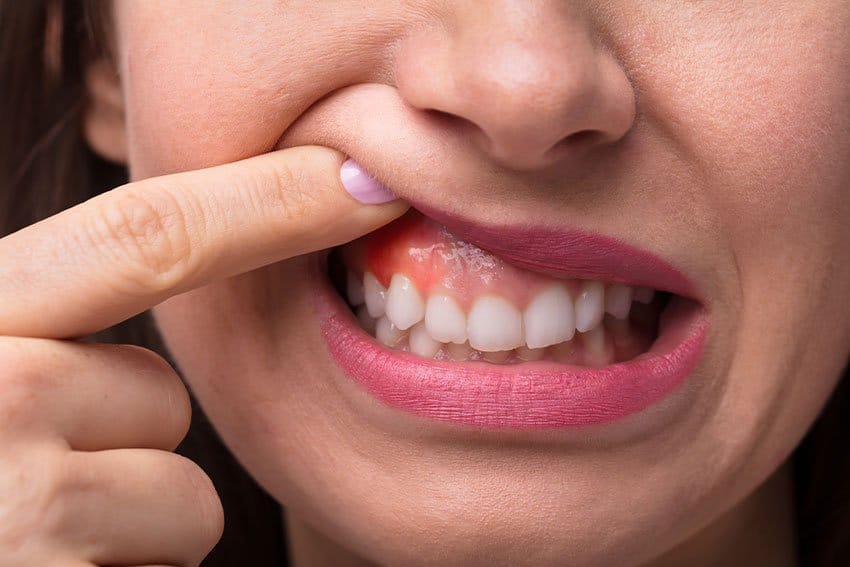Gum Disease Linked to Other Serious Health Risks

It’s well known that not taking care of your teeth can result in cavities and tooth loss. But did you know that not taking care of your gums can lead to gum disease and other serious health risks? Most people aren’t aware that oral health can affect your overall health. Discover the health issues linked to gum disease and how you can prevent them.
What is Gum Disease?
Gum disease, also known as periodontal disease, is caused by the accumulation of plaque around the teeth and gums. When it is left to build up it creates disease-causing bacteria that result in gum disease. If this bacteria is not removed properly by at-home dental care and professional dental care it can inflame the gums and lead to the destruction of tissue and bone that support the teeth.
Symptoms of Gum Disease
Periodontal disease is one of the most common diseases in the country and often occurs without any signs or symptoms. Typically symptoms include:
- Sensitive or bleeding gums
- Bad breath
- Loose teeth
- Swollen or red gums
- Tender or bleeding gums
- Receding gums
- Pain when chewing
The symptoms listed above are the most common indicators of gum disease. If you notice any of those symptoms, it’s important to schedule an appointment with your dentist as soon as possible. The earlier you seek treatment, the easier gum disease is to treat. Without early treatment, gum disease can cause bone loss, tooth loss, and not to mention increased severe health risks.
Gum Disease and Diabetes
One of the health risks that increase with gum disease is diabetes. Diabetes has the strongest connection to gum disease than any other health risks. When someone has diabetes, they don’t have a strong immune system. This means that when their gums accumulate bacteria, the body doesn’t have the strongest fighting chance. As a result, gum disease is more common in people with diabetes and it can progress much faster.
People with severe gum disease tend to have higher levels of HbA1C which is a form of glucose-linked hemoglobin used to measure the control for diabetes. Therefore, the relationship between diabetes and gum disease is a two-way road. Gum disease can affect glucose control and cause diabetes, and those with diabetes have a harder time fighting off bacteria and are more likely to get gum disease.
Nearly 1 in 5 people with gum disease also have diabetes and don’t know it. Researchers recommend that people diagnosed with gum disease get checked for prediabetes and diabetes.
For those who already have diabetes, it’s more important than ever to take care of their oral health to prevent diabetes.
Your Heart and Gum Disease
There is also a correlation between and the bacteria in your mouth and other serious health issues such as heart disease. The bacteria in your mouth fueled by gum disease can travel through your bloodstream and cause inflammation. Inflammation in your bloodstream can lead to high blood pressure, diabetes, arthritis, heart disease, and stroke.
Heart disease and gum disease are linked through inflammation and luckily for patients can be reduced by proper treatment of gum disease.
Gum Disease and Oral Cancer
April is oral cancer awareness month. As a way to spread awareness, we found it important to point out that there is a link between severe gum disease and oral cancer. Researchers don’t know why there is a link between the two just yet, but it’s important to know the link exists.
How to Prevent Gum Disease
The key to preventing serious health conditions as a result of gum disease is prevention and early treatment. One of the best ways to prevent gum disease is to evaluate your personal risk. Some people are more prone to gum disease than others due to genetics. This is something you should talk to your Tulsa dentist about.
You can also prevent gum disease by taking your oral health seriously. We recommend brushing at least twice a day and flossing once per day. For extra help brushing, consider investing in an electric toothbrush.
Studies suggest that only about 10% of Americans floss daily. If you’ve ever flossed your teeth, you know how much gunk you can pull out from between your teeth including plaque and food debris. If this consistently sits between your teeth without ever getting pulled out, it will eventually turn into cavities and gum disease. Flossing is one of the only effective ways to remove plaque and debris from beneath your gum line to directly prevent gum disease.
In addition to brushing and flossing, you should visit your Tulsa dentist at least every six months for a cleaning. During this time, Dr. Hodges will remove plaque and tartar from your teeth and between your gum line. If she also notices any signs of gum disease, she may need to give you a root planing and scaling (deep cleaning) and additional treatment if necessary. If you’re more prone to plaque and tartar than others, we may recommend dental cleanings every three months instead.
You can also reduce your sugar intake, quit smoking, and reduce alcohol intake to prevent gum disease.
It’s important to never skip your dental cleaning because it not only helps prevent gum disease but helps us catch and treat it early before it causes permanent damage.
Get Gum Disease Treatment in Tulsa
Aside from taking good care of your oral health, cutting back on sugar and alcohol, quitting smoking, and sleeping more, there’s not much else you can do to prevent gum disease. If you do happen to get gum disease, we offer gum disease therapy in Tulsa to help our patients maintain great oral health and to remedy the effects of gum disease. If you are showing signs of gum disease or know someone who is, contact us to book an appointment today.

élan Tulsa Cosmetic Dentistry
10031 S Yale Ave #104
Tulsa, OK 74137

